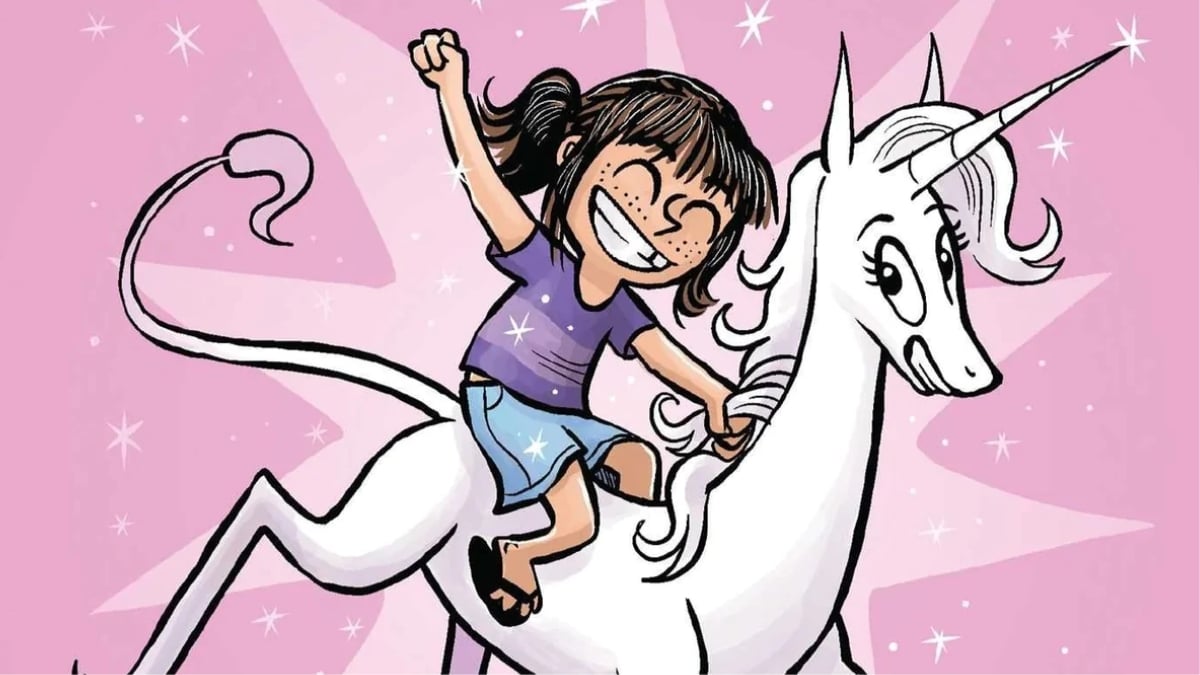Nickelodeon has axed an animated adaptation of the children’s comic Phoebe and Her Unicorn, allegedly because executives think it won’t draw enough of an audience if it doesn’t cater to young boys. Given the incredible success of animated series like She-Ra and the Princesses of Power, The Owl House, The Powerpuff Girls, and My Little Pony: Friendship Is Magic (as well as its numerous spinoffs), this couldn’t be further from the truth.
Phoebe and Her Unicorn entered the public consciousness when cartoonist Dana Simpson launched a daily children’s webcomic strip, Heavenly Nostrils, in April 2012. The story follows nine-year-old Phoebe Howell, who skips a rock across a pond and accidentally hits a unicorn in the face. The unicorn, named Marigold Heavenly Nostrils, has been stuck staring at her own reflection in the pond for some time—and Phoebe’s wayward rock frees her. As a reward, Marigold Heavenly Nostrils gives Phoebe one wish, which the girl uses to make the unicorn her best friend.
In 2014, Andrews McMeel Publishing released a collected edition of the strip, titled Phoebe and Her Unicorn: A Heavenly Nostrils Chronicle, and in 2015, the strip was syndicated for more than 100 print newspapers under the title Phoebe and Her Unicorn. Since that first collection was released in 2014, Phoebe has become a highly successful children’s comic series with 16 published books to date. Book #17, Punk Rock Unicorn, is slated for release in April 2023.
The animated adaptation was announced in 2020, and Deadline reported that Nickelodeon planned to turn it into a multi-platform franchise. Then, on December 28, 2022, Simpson posted on Facebook that the project was axed.
“I’d known that was probably coming for a few months. It’s an old Hollywood story. The executives who optioned my show in 2020 left, and were replaced by new people who were more…well. They started complaining that my project doesn’t cater enough to boys,” Simpson wrote. “Hollywood has an idea that boys won’t watch shows that center girls, but girls will watch shows that center boys (or, girls just ‘don’t like animation’), so marketing-wise you should only ever make boy shows, possibly with one token girl.”
We reached out to Simpson for confirmation or comment, but at time of writing have not heard back. In her Facebook post, Simpson—a transgender woman—notes, “I worried transphobia would screw me over. Turns out, no. Garden variety sexism.”
Nickelodeon was the second studio to acquire the rights to Phoebe and Her Unicorn. Previously, Amazon was developing an adaptation between 2017 and 2019, according to Simpson’s Facebook post. “In 2023 we have more meetings and keep trying,” she wrote.
It’s great that Simpson isn’t giving up, but it’s frustrating to see that Hollywood executives still think solely in terms of “boys vs. girls” when it comes to developing and producing content. Not only does this partition content into a gender binary that’s no longer suitable, but we regularly see this happen. Even when a series or franchise has strong female representation, the likelihood of seeing those characters in official merchandise—which is often a key marketing tool, especially for children’s media—is slim. In 2015, fans started a #WheresNatasha campaign on social media to call out the lack of Black Widow toys compared to her male Avengers teammates. The year before, McDonald’s released a line of Adventure Time toys without a single female character in the set.
Although shows like She-Ra and The Powerpuff Girls prove how ridiculous it is to preemptively cancel a show because it’s too girl-centric, that doesn’t change the reality that Simpson and other creators are often forced to face. Hollywood executives seem to see girls as a non-viable market, which, in a capitalist society, means that content catered to girls will get the axe faster and more frequently than content catered to boys.
Loudly advocating for shows like Phoebe and Her Unicorn to get off the ground is important. Throwing support (especially financial, whenever possible) behind girl-centric media is one of the only ways to prove to execs just how wrong they are, and to convince them that their ingrained sexism is hurting their strategy more than helping it.
(featured image: Simon & Schuster)
Want more stories like this? Become a subscriber and support the site!
—The Mary Sue has a strict comment policy that forbids, but is not limited to, personal insults toward anyone, hate speech, and trolling.—









Published: Jan 5, 2023 05:33 pm